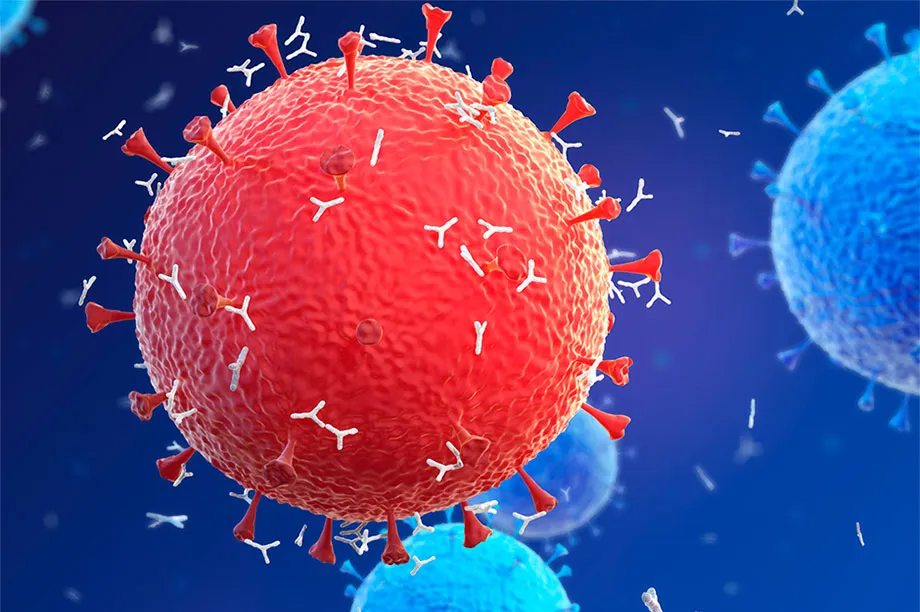Patients have been given the first dose of a potential antibody treatment designed to fight coronavirus.
The immune system produces antibodies to fight off foreign invaders when it detects infection.Scientists developed the antibody in just three months after identifying it from blood taken from one of the first American patients to recover from COVID-19.
This medicine, referred to as LY-CoV555, emerged from the collaboration between Lilly and AbCellera to create antibody therapies for the prevention and treatment of coronavirus.Researchers say it is the first potential new medicine specifically designed to attack SARS-CoV-2, the virus that causes COVID-19.
Read more about coronavirus treatments:
- Coronavirus treatments: five alternatives to vaccines
- Could antibodies found in llamas help us to defeat COVID-19?
The first patients in the study were given the medication at major medical centres in the US including NYU Grossman School of Medicine and Cedars-Sinai in Los Angeles. A single dose of the medicine is administered via IV to up to 32 participants.
The placebo-controlled study will assess safety and tolerability in patients hospitalised with with the disease, and results are expected by the end of June.

Mark Mulligan, director of the Division of Infectious Diseases and Immunology and director of the Vaccine Center at NYU Langone Health, said: “We are committed to working with our industry partners to generate scientific evidence to meet the urgent need for treatments that reduce the severity of COVID-19 disease.”
He added: “Antibody treatments like the one being studied here hold promise to be effective medical countermeasures against this deadly infection.”
Read more coronavirus news:
- COVID-19 asymptomatic in over 80 per cent of cases, cruise ship study finds
- Coronavirus in saliva could travel more than 5m in a 'slight breeze'
Daniel Skovronsky, Lilly’s chief scientific officer and president of Lilly Research Laboratories, said: “Antibody therapies such as LY-CoV555 may have potential for both prevention and treatment of COVID-19 and may be particularly important for groups hardest hit by the disease such as the elderly and those with compromised immune systems.”
If the Phase 1 results show the antibody can be safely administered, researchers will move on to start studying LY-CoV555 in non-hospitalised COVID-19 patients.
Eli Lilly and Company also plans to study the drug in a preventative setting, focusing on vulnerable patient populations who historically are not optimal candidates for vaccines.
AbCellera and the Vaccine Research Center at the National Institute of Allergy and Infectious Diseases (NIAID) identified the antibody.
How can I protect myself from the coronavirus when shopping?
You’ll have seen signs in your local supermarket advising you to keep two metres from others while moving around the store. This is key to reducing your chances of catching the virus while shopping.
The coronavirus SARS-CoV-2 is spread through respiratory droplets that leave our mouth and nose when we cough, sneeze, or sometimes even talk. The droplets sprayed out by an infected person will contain the virus, which could then enter your body via your mouth, nose or eyes (this is why you shouldn’t be touching your face).
Respiratory droplets don’t usually travel more than one metre, so by keeping two metres from others, you’ll reduce the likelihood of being in the firing line. To make it easier to keep your distance, try to shop during off-peak hours, choose a store that’s limiting the number of people who can be inside at any one time, and use self-checkout if you can.
Keeping your hands clean is the other main thing you can do. If possible, wipe the trolley or basket handles with a disinfectant wipe when you arrive at the store. When you get home, wash your hands or use hand sanitiser before and after unpacking your bags.
A US study found that the coronavirus can survive for up to 24 hours on cardboard, and up to three days on hard, shiny surfaces such as plastic, so wiping down your purchases with a disinfectant spray or a soapy cloth before you put them away is another good habit to get into.
Read more: